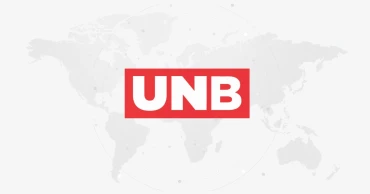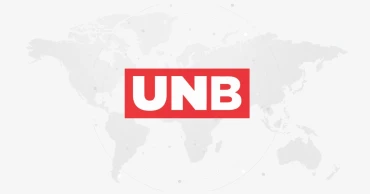index
DSEX index increases by 6.91 points with Tk 81.5 crore traded in first hour
The Dhaka Stock Exchange (DSE), the country's main capital market, saw a mixed trend of trading in the first hour on Monday.
The 3 indexes of the Dhaka stock market DSEX, DSES went up, and DS30 decreased in the first session of the second day of the week.
The main index DSEX increased by 6.91 points to 5,172.08 points, the DSES Shariah index up by 2.73 points to 1150.85 points, and the DS30 special blue-chip index down by 0.34 points to 1919.27 points during the first hour on Monday.
DSEX index drops by 34.44 points, prices of 270 companies decrease
On the day, the trading record in the DSE shows that shares and units of 3.31 crore were exchanged through 27171 transactions. In the first hour, the market witnessed huge selling pressure, and shares and mutual funds worth Tk 81.5 crore were traded.
During this time, a total of 357 companies participated in trading. Among these, prices of 174 companies increased, 90 companies decreased and 93 companies remained unchanged at the DSE.
1 year ago
DSEX index rise by 3.92 points; prices of 186 companies up in early trading
The Dhaka Stock Exchange (DSE), the country's main capital market, saw a mixed trend in the first two hours on Tuesday.
Two indexes—DSEX and DSES—increased in the morning while DS30 decreased slightly.
The main index DSEX increased by 3.92 points to 5,174.71 points; the DSES Shariah index was up by 4.40 points to 1160.31 points and the DS30 special blue chip index fell slightly by 1.06 points to 1921.04 points during the first two hours.
Shares and units of 4.09 crore were exchanged through 41650 transactions. In this time, the market witnessed huge selling pressure, and shares and mutual funds worth Tk 110.8 crore were traded.
DSEX trading ends with a 25.61 point drop
A total of 385 companies participated in trading. Among these, prices of 186 companies increased, 104 companies decreased, and 95 companies remained unchanged at the DSE.
1 year ago
Index marked downward trend last week as DSE lost 130.75 points
Bangladesh's stock market showed a downward movement last week as it lost 130.75 points and stable market to level 5198.
The percentage change for the broad index was 1.70 percent. Market participation was (minus)-15.92 percent compared to the previous week. The average daily turnover of the market was Tk465.8 crore.
Bangladesh is experiencing substantial economic and banking sector transformations, marked by significant developments across various industries.
The cost of the MRT-5 metro rail project was slashed by BDT 6,898 crore after a reassessment by the Dhaka Mass Transit Company Limited (DMTCL), demonstrating the significant savings achievable through reevaluation of mega projects.
Concurrently, the Bangladesh Small and Cottage Industries Corporation (BSCIC) aims to allocate 1,089 vacant plots and rejuvenate inactive industrial units to stimulate entrepreneurship, inviting applications from interested parties.
The banking sector faces challenges as the call money rate surged above 10 percent due to a liquidity crunch driven by banks' increased investments in government treasuries, which offer higher, risk-free returns. On a positive note, domestic credit card spending saw a 14.42 percent rise in September, reflecting heightened consumer activity, while BB Governor Dr. Ahsan H. Mansur emphasized the need for drastic reforms to restore trust in the banking sector, acknowledging past irregularities and regulatory shortcomings.
Meanwhile, leather footwear exports soared to a five-year high in the July-October period, attributed to competitive labor costs and a shift in orders from China.
Mixed performance in Dhaka Stock Exchange: DSEX gains 5.65 points in early trading
The tax return submission deadline has been extended to December 31, and the Bangladesh Bank relaxed LC margins on essential imports for Ramadan, aiming to ensure adequate supply and stabilize prices. The World Bank's Business Ready report for 2024 ranked Bangladesh 38th out of 50 countries in trade efficiency, highlighting progress and challenges with scores in regulatory framework, public services, and operational efficiency.
Following the political changeover, bad loans in banks hit a record Tk 284,977 crore, with a significant rise in defaults attributed to irregularities involving Awami League-affiliated businesses.
Austrian companies are keen to invest in Bangladesh, as expressed by the Austrian envoy, while the IMF prepares to review progress on loan conditions for the fourth tranche release.
DSE index rises by 39.30 points with increased trading volume
The BB has directed banks to ensure the smooth exchange of Tk 1, 2, and 5 coins, addressing previous misinterpretations of its instructions. Moody's downgraded Bangladesh's long-term ratings to B2 with a negative outlook due to increased political risks and economic slowdown, while reaffirming the need for substantial reforms.
Despite these challenges, Finance Adviser Dr. Salehuddin Ahmed assured that no banks would be closed, reinforcing the central bank's stance.
The interim government's reform measures and falling global interest rates have attracted foreign investments, with notable interest in equity markets.Container handling at Chittagong Port increased by 9 percent over the past three months, and a new direct shipping route between Karachi and Chattogram is set to expedite trade, reducing reliance on transshipment ports like Colombo and Singapore.The government permitted 277 firms to import 14.81 lakh tonnes of rice, a mix of boiled and sunned rice, to curb domestic prices.However, the RMG sector experienced a 2.47 percent negative growth in exports to the EU during January-September due to energy shortages and high production costs. The rising taka-dollar exchange rate impacted trade competitiveness, as the real effective exchange rate (REER) index rose, signaling increased price levels compared to trade partners.
Moody's further downgraded Bangladesh's banking sector to "very weak," citing client confidence issues and limited transparency. Despite the sector's struggles, measures are being taken to stabilise the situation and attract foreign investments, indicating a resilient and adaptive economic landscape.
The agriculture sector, too, is changing as the government focuses on improving yield and reducing dependency on imports. Initiatives to boost local production of essential goods are underway, reflecting a broader strategy to enhance self-sufficiency. Infrastructure projects, including the Padma Bridge and various road network expansions, are expected to spur economic growth by improving connectivity and reducing transportation costs.
Moreover, digital transformation efforts are gaining momentum, with increased emphasis on financial inclusion through mobile banking and fintech innovations. These innovations aim to bring a larger segment of the population into the formal economy.
Overall, these multifaceted developments underscore Bangladesh's dynamic and evolving economic environment, presenting opportunities and challenges for future growth and stability.
1 year ago
Dhaka Stock Exchange sees early week gains
The Dhaka Stock Exchange (DSE), the country's main capital market, opened the week on a positive note as stock prices of the majority of listed companies showed an upward trend during Monday's trading session.
According to early market data, the DSEX, DSE's benchmark index, gained 3.49 points, reaching 5,382 points within the first hour of trading by 11 am. The Shariah-compliant index, known as DSES, also saw a rise of 3.90 points to 1,194 points, while the DS-30 index, which tracks the performance of blue-chip stocks, increased by 1.68 points, reaching 1,965 points.
Read: Dhaka Stock Exchange investors demand BSEC Chairman’s resignation amid market instability
During this period, a total of 89.95 crore shares and units were traded across the exchange. Market performance was mixed, with the share prices of 147 companies rising, 145 companies falling, and 74 companies remaining unchanged.
1 year ago
No progress in the level of prejudice shown against women in 10 years: UN report
There has been no progress in the level of bias against women over the previous ten years, with nearly nine out of ten men and women still believing such prejudices globally, according to a new UN report released on Monday (June 12, 2023).
UN Development Programme (UNDP) in its most recent Gender Social Norms Index (GSNI) says , "Half of people worldwide still believe men make better political leaders than women, and more than 40% believe men make better business executives than women."
Also Read: 9 countries inc. Bangladesh release first national estimates of illicit financial flows with UN support
“Social norms that impair women’s rights are detrimental to society more broadly, dampening the expansion of human development,” said Pedro Conceição, head of UNDP’s Human Development Report Office.
A staggering 25 per cent of people believe it is justified for a man to beat his wife, according to the report, reflecting the latest data from the World Values Survey.
The report said that these biases are to blame for the obstacles women encounter, which have taken the form of the denial of women's rights in many regions of the world, the growth of movements opposing gender equality, and an increase in human rights abuses in some countries.
The stark underrepresentation of women in leadership positions is another example of bias in action. Since 1995, the percentage of women serving as heads of State or governments has generally hovered around 10%, and in the job market, they make up less than one-third of executive posts.
The report also sheds light on a broken link between women’s progress in education and economic empowerment.
Also Read: A child or youth died once every 4.4 seconds in 2021: UN report
Women are more skilled and educated than ever before, yet even in the 59 countries where women are now more educated than men, the average gender income gap remains a 39 per cent in favour of men.
“Lack of progress on gender social norms is unfolding against a human development crisis,” Conceição said, noting that the global Human Development Index (HDI) declined in 2020 for the first time on record and again the following year.
“Everyone stands to gain from ensuring freedom and agency for women,” he added.
The UNDP report emphasized that governments have a crucial role in shifting gender social norms, from adopting parental leave policies, that have changed perceptions around care work responsibilities, to labour market reforms that have led to a change in beliefs around women in the workforce.
“An important place to start is recognizing the economic value of unpaid care work,” said Raquel Lagunas, Director of UNDP’s gender team.
The report emphasized that despite the continued prevalence of bias against women, the data shows change can happen.
Also Read: Rights groups slam severe Taliban restrictions on Afghan women as ‘crime against humanity’
An increase in the share of people with no bias in any indicator was evident in 27 of the 38 countries surveyed. The report authors said that to drive change towards greater gender equality, the focus needs to be on expanding human development through investment, insurance, and innovation.
This includes investing in laws and policy measures that promote women’s equality in political participation, scaling up insurance mechanisms, such as strengthening social protection and care systems, and encouraging innovative interventions that could be particularly effective in challenging harmful social norms, patriarchal attitudes, and gender stereotypes.
For example, combatting online hate speech and gender disinformation can help to shift pervasive gender norms towards greater acceptance and equality, according to the report.
The report recommended directly addressing social norms through education to change people’s views, policies and legal changes that recognize the rights of women in all spheres of life, and more representation in decision-making and political processes.
Read more: 90% of countries see decline in human development
2 years ago
Brand Finance Global 500 index: Huawei becomes 9th most valuable brand
Chinese telecom giant Huawei has made its place in the world's top 10 most valuable brands of 2022, announced recently by Brand Finance Global 500.
This year, Huawei has jumped six places in comparison to last year in the annual Brand Finance Global 500 index.
Huawei has become the ninth most valuable brand in the world with a 29 percent growth to $71.2 billion.
READ: Huawei Bangladesh for collaborative efforts to widen digital education, online learning scopes
Despite the unprecedented situation created by the pandemic, the company focused on its ICT services and ploughed revenue back into innovations.
Huawei Rotating Chairman Guo Ping said, "Despite all the trials and tribulations, the company worked with customers and partners to ensure business as usual. After adjusting its strategy accordingly, overall performance was in line with our forecasts."
Read Vivo showcases tech trends for 2022
Leading brand valuation consultancy Brand Finance adjudicates 5,000 of the biggest brands and publishes reports every year, ranking the most valuable brands across different sectors.
This year, alongside Huawei, Apple has won the world's most valuable brand title whereas WeChat has become the world's strongest brand.
4 years ago
Dhaka is world's most polluted city
The densely populated capital of Bangladesh continues to dominate the list of world cities with the worst air quality.
5 years ago
Chinese medicinal material price index down 0.02 pct
The Kangmei Chinese medicinal material price index, a barometer of the traditional Chinese medicine (TCM) material market, dropped 0.02 percent to 1,229.33 points on Wednesday.
6 years ago





.jpg)








